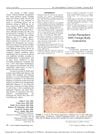 September 2023 in “Frontiers in medicine”
September 2023 in “Frontiers in medicine” The mTOR signaling pathway is crucial for hair health and targeting it may lead to new hair loss treatments.
 August 2023 in “JAAD Case Reports”
August 2023 in “JAAD Case Reports” A woman with lupus experienced hair regrowth after treatment, but hair transplantation is not advised for her condition.
 July 2023 in “Dermatology and Therapy”
July 2023 in “Dermatology and Therapy” 5-Alpha Reductase Inhibitors are effective for male hair loss and some skin conditions, but their effectiveness in women and safety concerns require careful use.
 May 2023 in “Elsevier eBooks”
May 2023 in “Elsevier eBooks” Some treatments that modify the immune system might help with certain types of hair loss but haven't been explored for common hair loss alone.
 May 2023 in “Australasian Journal of Dermatology”
May 2023 in “Australasian Journal of Dermatology” Various substances, including cosmetic sponges, vein glue, chai tea, skincare products, and medicaments, can cause allergic contact dermatitis, and healthcare workers often react to N95 masks.
 May 2022 in “Journal of the Egyptian Women's Dermatologic Society (Print)”
May 2022 in “Journal of the Egyptian Women's Dermatologic Society (Print)” Women's hair loss can be due to hormonal changes and various conditions, with treatments focusing on stopping progression and managing symptoms.
January 2022 in “Clinical Cases in Dermatology” A woman has a permanent hair loss condition treated with steroids and new medicines, but hair might not regrow.
 September 2021 in “CRC Press eBooks”
September 2021 in “CRC Press eBooks” Lichen planopilaris causes permanent hair loss and scarring due to damage to hair follicles and can be mistaken for other hair loss conditions.
 March 2021 in “CRC Press eBooks”
March 2021 in “CRC Press eBooks” New hair treatment methods are evolving, with microneedling as a promising technique for hair growth.
 September 2020 in “British Journal of Dermatology”
September 2020 in “British Journal of Dermatology” The document highlights advancements and findings in dermatology, including AI use, disease prevention, treatment efficacy, and the impact of conditions on patients' lives.
October 2019 in “CRC Press eBooks” Retinoids can both cause and treat different hair disorders.

The document concludes that diagnosing female hair loss requires careful examination, with treatments varying by condition and psychological support often necessary.
 May 2019 in “Australasian Journal of Dermatology”
May 2019 in “Australasian Journal of Dermatology” The conclusion is that managing hair loss conditions like FFA and melanoma requires individualized approaches, considering new findings and balancing treatment benefits with potential risks.
 March 2019 in “Dermatologic Clinics”
March 2019 in “Dermatologic Clinics” The document concludes that there have been significant advances in the treatment and diagnosis of various skin conditions.
 April 2018 in “Journal of Investigative Dermatology”
April 2018 in “Journal of Investigative Dermatology” Different types of stem cells in the skin contribute to the variety of melanoma forms.

Effective treatment for midlife women's hair loss is limited, with 5% minoxidil foam being the only proven option for the most common type.
 April 2017 in “Australasian Journal of Dermatology”
April 2017 in “Australasian Journal of Dermatology” The session covered updates on skin treatments, including radiotherapy, imiquimod, acitretin, JAK inhibitors, and strategies for managing rosacea and preventing surgical infections.
 April 2012 in “Informa Healthcare eBooks”
April 2012 in “Informa Healthcare eBooks” Lichen planopilaris is a rare, chronic condition causing hair loss, mainly in middle-aged women, and early treatment is important to prevent permanent baldness.
 69 citations,
August 2014 in “Journal of The American Academy of Dermatology”
69 citations,
August 2014 in “Journal of The American Academy of Dermatology” Trichoscopy is a quick, cost-effective tool for diagnosing different hair loss conditions.
 36 citations,
June 2018 in “Journal of The American Academy of Dermatology”
36 citations,
June 2018 in “Journal of The American Academy of Dermatology” Dermoscopy is useful for diagnosing various skin, hair, and nail disorders and can reduce the need for biopsies.
 22 citations,
October 2020 in “Anais Brasileiros de Dermatologia”
22 citations,
October 2020 in “Anais Brasileiros de Dermatologia” The Brazilian Society of Dermatology agrees that oral isotretinoin is effective for acne and other skin conditions, and it's safe when monitored, but more research is needed on dosing and duration.
 19 citations,
April 2018 in “International Journal of Dermatology”
19 citations,
April 2018 in “International Journal of Dermatology” People with Lichen Planopilaris are more likely to have autoimmune diseases, especially Systemic Lupus Erythematosus, and less likely to have diabetes and some other common conditions.
19 citations,
July 2017 in “Clinical and experimental dermatology” Men with lichen planopilaris had earlier onset than women, and treatment usually improved the condition.
 8 citations,
July 2020 in “Journal of The American Academy of Dermatology”
8 citations,
July 2020 in “Journal of The American Academy of Dermatology” Patients with Lichen Planopilaris are more likely to have rosacea and skin cancer but less likely to have congestive heart failure, stroke, and glaucoma.
 6 citations,
August 2020 in “Clinical case reports”
6 citations,
August 2020 in “Clinical case reports” Isotretinoin was not effective in treating facial lichen planopilaris.
 6 citations,
April 2016 in “PubMed”
6 citations,
April 2016 in “PubMed” The review found that women using hair loss drugs like finasteride and dutasteride rarely reported sexual side effects.
 5 citations,
March 2019 in “Dermatologic Clinics”
5 citations,
March 2019 in “Dermatologic Clinics” New treatments for hair loss show promise, but require more research on long-term effects and proper dosing.
5 citations,
July 2018 in “Skin appendage disorders” Sunscreen spray on the scalp may be linked to a type of scarring hair loss.
 5 citations,
April 2014 in “The American Journal of Dermatopathology”
5 citations,
April 2014 in “The American Journal of Dermatopathology” Foreign-body granuloma may be a marker for late-stage Lichen Planopilaris and should be considered in diagnosis.
 4 citations,
April 2018 in “British Journal of Dermatology”
4 citations,
April 2018 in “British Journal of Dermatology” Finasteride for female hair loss has low side effects, more research needed.


























